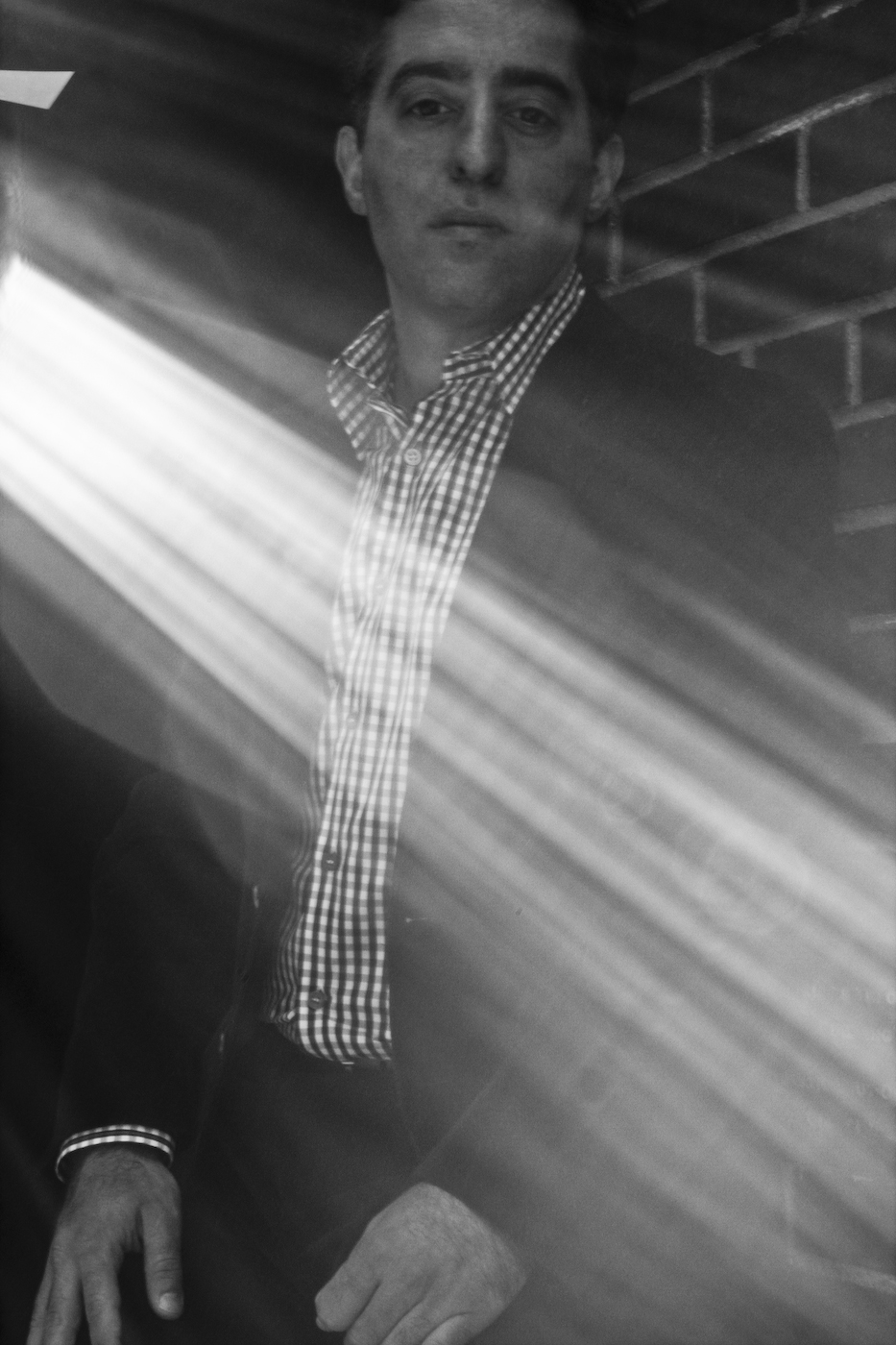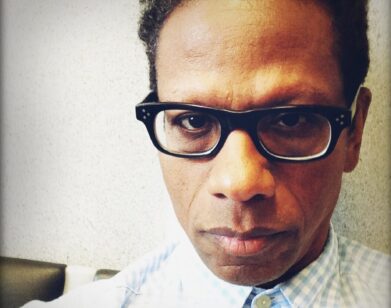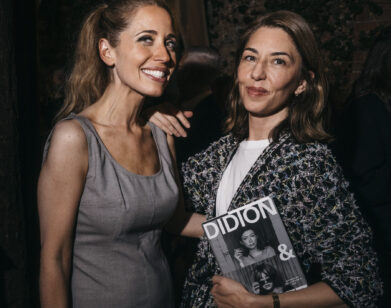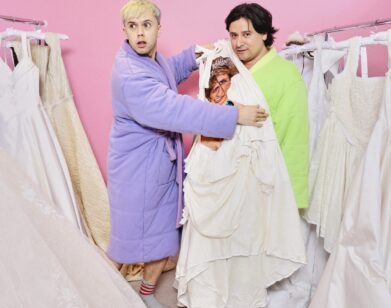Three’s a Charm for Nathan Englander

If I could switch brains for 24 hours with anyone of my generation, I would pick Nathan Englander. His mind runs at frightening rapid-rail speeds, and even his casual, offhand observations are filled with the kind of insight and humor that screenwriters spend years trying to jam into their dialogue.
A quick wit may come naturally to the 42-year-old native New Yorker, but that doesn’t mean he doesn’t work hard. 2012 is an object lesson in Englander endurance, when three of his years-in-development writing projects are slated to hit shelves, stages, and Seder dinners (respectively). First comes his latest-short story collection What We Talk About When We Talk About Anne Frank, out this month from Knopf. Then in March, Englander ambitiously teams up with writer Jonathan Safran Foer on a translation of the Haggadah, the ancient Jewish text recited at Passover.
Finally in November comes the opening of his play at the New York Public Theater, adapted from his short story “The Twenty-Seventh Man.” Most readers primarily know Englander as a short-story writer from the success of his 1999 collection, For the Relief of Unbearable Urges. But I first discovered him as a novelist with his haunting epic set during Argentina’s Dirty War, 2008’s The Ministry of Special Cases, and then worked my way back, angry not to have discovered him sooner.
The bold choice of the new collection’s title could be read as Englander, after years of asked what being a “Jewish writer” is like, finally saying, “Here you go. Does this answer the question?” But what we get in these eight stories is also much more than that—stories of families weighted in tradition and family members wading through their own uncertain lives, repeating history or feeling conflicted about not repeating it.
Englander’s stories are more somber than the man who I met for lunch in January, a man of prodigious linguistic talents, one of which being the ability to eat sushi while answering so many questions at the speed of light.
CHRISTOPHER BOLLEN: You’re busy this year. How do you have time for this lunch? You’re putting out a book of short stories, a translation, a play…
NATHAN ENGLANDER: I’m not used to dealing with the outside. Now I have to work hard and wear pants.
BOLLEN: You definitely have to wear pants every day now. I remember hearing about this play you are writing for two years. It was supposed to premiere this spring but now it’s been moved to the fall.
ENGLANDER: Something would have really suffered if I had put it on this spring. I’ve worked really hard these last years, and since everything is coming together at the same time, I had to move the play back. I’m kind of in love with my theater agent. I’m a true naïve about the theater, a total innocent. He says to me, have you ever been to a rehearsal room? Do you realize you are opening at the Public in New York? You do understand that the audience will be New York theater people?
BOLLEN: That’s intimidating. But you aren’t directing it…
ENGLANDER: No. Barry Edelstein, who runs the Shakespeare Initiative—you know Shakespeare in the Park—he’s the director. And he gives me notes. I first worked on the play with Nora [Ephron] for weeks and weeks and months and months.
BOLLEN: Is she co-writing?
ENGLANDER: No. She’s more like a dream supporter. It was her idea to adapt it. I would draft it, send it to her, and she would give me brilliant notes and beat me up and send me home. She still gives me notes and comes every week—she’s super involved.
[WAITER COMES. BOLLEN ORDERS A COFFEE]
ENGLANDER: I’m a recovering coffee addict, about two years clean. It’s like being an ex-crackhead.
BOLLEN: I’m an addict. I can’t begin work without coffee. I sometimes envision making more coffee while drinking a cup.
ENGLANDER: I would drink gallons of it a day. Even now, off caffeine, I talk faster than anyone you’ve ever met. I finally recognized that I’m naturally amped up. But when I quit I was worried that I would never write again. It was like anyone who’s kicked a habit. I was in a blanket shivering, trying to kick the horse.
[WAITER DELIVERS THE COFFEE. BOLLEN POURS SOY SAUCE INTO HIS COFFEE INSTEAD OF MILK. THE WAITER NOTICES AND TAKES THE COFFEE AWAY]
ENGLANDER: Did you just pour soy sauce in there? That’s awesome.
BOLLEN: I’m such an Ohioan that I would have just drunk it and not said a word if the waiter hadn’t noticed.
ENGLANDER: That’s funny. That matches the Jewish thing, straight up. If your chair were on my foot this whole interview, I would say nothing. I would prefer to say nothing and go to the hospital afterward.
BOLLEN: Back to the play, you know I think sometimes being a neophyte can be an advantage. If you don’t know all the ins and outs of a field, you can take risks and do great things because you don’t know any better. This is your third book, so you’re pretty much an old hand in the literary world compared to when you put out your first short story collection ten years ago.
ENGLANDER: Yeah. The ungenerous interview after the first book came out was something along the lines of, “It must be so much pressure to write the follow-up. It must be soul-crushing, mind-numbing pressure.” Then they would list every writer who never managed to write a second book. I would say, “Thank you for your generosity.” It took me a decade to write the novel.
BOLLEN: Wow, that’s an aggressive interview tactic. Did these early interviewers have a deep-seeded interest in your failure?
ENGLANDER: I preface this by saying the less-than-generous interviewer. Most everybody’s a peach. But for nearly a decade I had to walk around saying, “I’m writing a book.” Saying “I write books” sounds so much better as a career than saying “I write book.” But it’s useless to complain because that’s part of writing. It’s elemental to what you are doing. All of that pressure and expectation is just part of living life when you’re identified as a writer.
BOLLEN: I was reading some old interviews you did and I noticed that everyone always asks you about the future of the written word. For some reason, interviewers have decided that you are the writer capable of answering this question about literature. That question—is literature dying?—is completely ludicrous. Why are writers so obsessed with their demise? Or why do they lack confidence in their chosen field? So my question to you isn’t, is literature dying, but rather, why does everyone seem to ask Nathan Englander in particular that question?
ENGLANDER: I’m just surprised you didn’t ask me a Jewish question, which I always get. I’m already tickled pink that that wasn’t where you were headed. My answer to the “writing is supposed to die” question is badass existential—not neurotic existential. If a form is supposed to die, let it die. What can you control? It’s one thing if you go into finance for security and suddenly all of your money is gone. Or if you are flying planes for Pan Am, and then your pension is gone. There’s no safety in anything, but in the arts, there is really this idea of no promises. I didn’t follow the writing dream for safety. And yes, it’s a strange time as forms go. I love the printed book.
BOLLEN: I think the real question behind it is: do you think we as a culture or a people have lost the ability to sustain an attention span that is required of literature? Is there the human capacity to interact with a medium that doesn’t have flashing lights? But maybe we are evolving from those old narrative forms.
ENGLANDER: People love their club drugs. But if I told you in the ’60s or ’70s, when people were really burning out, that one day the youth dropping copious amounts of basement-made acid would be taking over the culture, you’d be terrified and think there was no turning back. It’s a crazy idea, this idea that people have no self-control and once one person starts it will never stop and take over the world. This idea that America eats itself to death…
My point is, if our attention span is damaged much further, I don’t know how we are going to dress ourselves. It’s either a phase or we will maintain this level. But I feel like it’s just a fad. Like the fact that I can’t take my iPhone out of my hand cannot be a permanent state. I can’t imagine I will die holding my iPhone. Except if I walk out into Sixth Avenue with cars barreling toward me…
BOLLEN: But the world has accommodated, so people can walk around safely paying no attention and staring into their little screens. It’s like when cars were invented. I imagine some people assumed cars would be skidding everywhere killing people left and right. But we’ve learned how to maintain some sort of order.
ENGLANDER: The answer is to write a book so good that people will read it. Even if it’s something like Harry Potter, a whole generation of kids read those fat novels. They managed to get through those even while they were texting.
BOLLEN: Did you write all of these stories at once, anticipating that they would be collected together, or are these just a selected survey of recent writings?
ENGLANDER: They all fit into this notion about identity. I feel very lucky that I have this career that allows me to say, “I’m ready to start now on this project” and I can go and do it. When I was writing a novel [The Ministry of Special Cases] on Argentina for 10 years, I barely managed to brush my teeth and write in a day. That’s where my head was. I want to think about Argentina so I can’t get dressed or answer email or pay the phone bill. I don’t know how to be in the world beyond fulfilling the basics in personal hygiene. That was where my head was at.
BOLLEN: So what was the impetus for this collection?
ENGLANDER: This collection was due to the months I was living in Germany a couple of years ago. I was staying in this house that was a Jewish house taken over by the SS on Lake Wannsee, the lake of the Final Solution in Berlin. I knew it wasn’t just a tic that I was getting nutty for Nazi, WWII guilt, Holocaust, Jewish material… it was much more than that. We talked about the pressure of the first book and the kinds of questions I was constantly asked. “You’re a Jewish writer. You’re a Jewish writer. You’re a Jewish writer.” I could address that subject or I could move it aside. But it took me a long time to understand what that meant, what I was supposed to think, what being a Jewish writer was supposed to mean for me. But I did wonder, God, is this the theme of the book?
You know, I’m terrified of people who say every story has been written or everything’s been done. I don’t often advise suicide, but you shouldn’t probably kill yourself right now if that’s the case. If the world is that meaningless to you that every experience has already been had, absorbed, and processed…
BOLLEN: I hate that stupid literary saying: a writer only has one story to tell, and he tells it over and over. I don’t remember who said that. Someone did.
ENGLANDER: It was someone who wanted to not feel guilty for reading just one story by every writer. Human experience is infinite, lives are infinite, stories are infinite. Just because one story has gravity in it doesn’t mean you can’t write a different one with gravity in it. Or monkeys. Or people eating. Anyway, for me, I think the stories happened because I was suddenly out of New York, getting out of my head, my brain relaxed to this position. It was very freeing. This book isn’t the result of digging through the story drawer. I wrote most all of the stories in a year. I tend to feel that collections should have a thread and an arch.
BOLLEN: It’s interesting that you feel you get the “Jewish writer” classification a lot. But by calling the book What We Talk About When We Talk About Anne Frank you are really putting that identity out there. You’re kind of asking for Jewish writer questions.
ENGLANDER: I know what’s in this title. That was a decision. That’s my point. If it were just a joke, I wouldn’t really think about it aesthetically, literarily, intellectually, emotionally. [CHOKES ON DRINK.] And now I’m going to die.
BOLLEN: I’m glad I got your last interview. and we ended it on the Jewish question.
ENGLANDER: And then he died… But my point is the title is the title of a short story. And it was about giving myself permission, ideas of ownership.
BOLLEN: I watched a YouTube clip where you were discussing an interesting writing situation when it comes to describing characters. You were saying that you don’t describe your characters as “Jewish” because they are Jewish and to do that would be writing as an outsider to your own world. It wouldn’t make sense to have a boy see his father and the first thing he noticed was how Jewish his father was. But it brings up a strange anxiety writers face when dealing with and describing others. In the novel I wrote, I didn’t describe each character as “white” every time they were introduced. But, full disclosure, I probably did state races when they weren’t white. “And then John spoke, a tall black man…” I’m not sure as a writer how to get over that obstacle unless you describe all races of every character no matter what. It’s almost a trap.
ENGLANDER: It’s not a trap. You can call it a trap or you can call it the most amazing, beautiful thing of why writing is the supreme form of all forms. I saw a friend I hadn’t seen in 15 years, this wonderful poet out in Madison—
BOLLEN: His name is Robert Madison?
ENGLANDER: No, out in Madison, but that’s a great name. For a porn star.
BOLLEN: I would trust whatever Robert Madison asked of me.
ENGLANDER: I’m going to start leaving you voice mails as Robert Madison. Happy New Year from Robert Madison.
BOLLEN: I’m going to take out a stalking charge against Robert Madison.
ENGLANDER: So this poet friend of mine was reminding me how I would use words just for their onomatopoeic elements and not for their actual meaning. And I still do. I use louche completely wrong. This is so louche, which doesn’t mean louche at all. And a friend was calling another friend feckless. She didn’t mean worthless, she meant dressed so neatly.
My point is, when we read, every word has unique meaning to each person. You’re from Ohio. If your world is populated by white people, that’s how you populate it until you’re told otherwise. An African-American writer doesn’t have to say, two black men are talking. Who the fuck else is supposed to be talking?
People ask this Jewish question over and over. And yet I’m not asking you how being from the Buckeye State has influenced your salad. The question being asked with the Jewish thing is literally equivalent to this: how has existing on the planet sparked your imagination? My stories are Jewish in thought and Jewish in many elements. Like the story “Sister Hills” is almost an umbrella of Jewish law. [“Sister Hills” involves promises made between two families that settle on the West Bank and how those promises collide with religion and secular law]. But what’s weird is that they don’t do it by nation, only by religion. Nobody treats Russian fiction as a genre of fiction.
BOLLEN: Do you think that’s an American reflex—to group everyone by some sort of a distinct sub-category. Here’s your aisle for gay, or African American, or Jewish literature?
ENGLANDER: I can’t decide who gets it hardest. Gay literature might get it the hardest in the stores.
BOLLEN: We ghettoize everything. Even Amazon does that. My fictional novel was bizarrely sub-categorized “9/11 nonfiction” on Amazon.com. How it got there, I have no idea.
ENGLANDER: God bless, I’d love to see this book on the Hanukkah table, but it should also be filed under “where stories go.” I feel calmer about it now that I know what it is after 15 years of thinking about it. See me however you want. Sit here with me and think, I’m having lunch with a Jew today. Knock yourself out. Like that Latter Day Saints commercial from when I was a kid: “Some of my kids’ friends are Jewish.” It ran for forever in New York. There’s a grandfather fishing with a boy and he’s like, “Timmy’s my Jewish friend and he’s like a son.” And it was an anti-prejudice commercial! Anyway I refuse to make a question flow more easily by looking at myself, and seeing myself as other. Which is why I think I was so drawn to Israel all of those years. It’s the one country where I’m not Jewish. You’re not being Christian now by sitting with me at this table, do you?
BOLLEN: I’m really Catholic at this moment. I only want to talk about the Kennedys, if that’s okay. But I will say about the story you mention, “Sister Hills,” that the depiction of the Jewish laws against secular worldviews might be controversial to some. It doesn’t paint those religious promises in a very positive light—which isn’t a bad thing. It’s a very dark story.
ENGLANDER: I remember sending pages to a couple of friends. Literally I was probably just drafting and sent some pages and said, “I want no comments, I want no feedback. Just tell me if I’ve lost my mind. When you read this, does it sound like a narrative, does it make sense?” They both were like, “It sounds like a story to me,” and that’s all I wanted to know. It was so emotionally draining. The emotional investment is large with everything when I’m working on it. I couldn’t sleep that night. I was like, I don’t know what this story is or how it’s going to be read. It’s a loaded story, but my position doesn’t matter, my obligation is to the story. I just bumped into one of the sweetest warmest New York moments last night. I was just leaving a meeting and I walked by someone on the street and he said “Nathan Englander,” and I said, “Yes?” He was just talking to other people on the street and he had just read the collection. It was really a funny moment. I was like “Yes,” and he was like, “Yes, can I help you?”
BOLLEN: Only in New York can you be talking about someone and then they magically appear, destroying all sense of separation between fantasy and reality.
ENGLANDER: This guy was Jewish and he lived in Israel. It was a case I call having your claws out. It was really lovely to hear about this story through him. That was the emotional part, I’ve written about something that everyone has an extreme position on and nobody’s position seems to match. Everyone is going to be looking to be upset.
BOLLEN: It’s exciting to have a piece of work that is contentious, where the writer doesn’t even know how it will be read. As long, of course, as you can deal with the criticism. Hopefully you will not become the kind of writer who feels a need to write an essay attacking the critic because the critic gave a mediocre review.
ENGLANDER: I get where that comes from. It’s a really dangerous thing. I was talking to a bookseller in New Orleans and she was talking about how she can’t talk to writers she likes. I was thinking, “Now, should I be insulted if this bookseller is eloquent in her support?” But people take ownership of material. I’ve learned to hear “I think your spine should have been gray instead of black.” That’s their way of taking ownership.
With criticism, it’s mostly a sincere act. There was this Paris Review interview with Marilynne Robinson, who I love. I studied with her. She said beautifully that people spend a decade on a novel. It’s really their whole life. I don’t think most people would even want to type a book if you paid them, let alone write it. If I said, “Here’s Moby Dick, type this for me,” most people wouldn’t get through it. Let’s have a contest. I’ll fund it. $1000 for the first person to type Moby Dick over. You’re not going to get a lot of entries. With my novel, I spent eight years, a literal fortune, a decade of my life graying at the temples. What could that be except the most sincere act of faith or dedication. So it is painful that someone would want to interact with someone’s book in a flippant way. I know when that hits a writer. I know friends that do that, who start those wars. It never ends. Just don’t do it.
BOLLEN: You are also about to release a translation of the Haggadah. Obviously you were familiar from the text from Passover…
ENGLANDER: I don’t do traditional things really. I’ll go to a Seder with friends. And Foer is a good friend. He’s the editor. I’m translating. My point is Jonathan knows me. I’ve known him since he’s starting writing. He really made a wonderful case for taking on this thing that I had no interest in and no background and did not see myself fit for. When I did this translation, we really worked hard and he really challenged me in ways that were helpful. He really put in hours with me. I got involved in elements of design. It became my baby too. I really loved being a part of it.
BOLLEN: And Foer is also surveying the illustration too. He got this Israeli artist Oded Ezer on the project, right?
ENGLANDER: That’s my joke with Jonathan. “Jonathan, with you everything is illuminated.” There’s no pictures, just illuminated manuscript. So that’s the idea, Oded did the design, I did the translation.
BOLLEN: That’s a lot of pressure knowing that people will use your translation as a religious text. That isn’t quite the same thing as writing a fictional story.
ENGLANDER: It was the strangest process. I had to think, most Americans who use this, especially those who are really faithful but don’t speak Hebrew, will literally be praying and saying blessings to God. This goes back to living in Israel, and understanding global politics and how the world works. I used to be so much calmer as a citizen because I thought the president was in charge. The moment I understood while I was living in Israel that George Bush is just a man in charge, just this guy, I was really scared.
BOLLEN: It’s equivalent to the moment as a child when you realize that if a serial killer breaks into your house, your parents may not be able to save you—that, in fact, they are just as likely to become victims. It’s a terrifying moment of self-awareness.
ENGLANDER: Which is a really popular fear.
BOLLEN: The serial killer thing?
ENGLANDER: Yeah. With kids. Kidnapping. Break-ins. I didn’t really have that fear. Anyway, it’s the same with translations. There is a person behind it. The Bible is God’s book. He told Moses. But God didn’t write the King James version.
BOLLEN: And of course it isn’t the Shoemaker James version. It’s the King James version, to give it as much human weight behind it as possible.
ENGLANDER: Right, as a first translation project, with which people will pray to, is a really strange place to start. It was very good for me, my lack of confidence and my tortured sense of self and all that. But the Haggadah wasn’t going to get translated unless I owned it. I thought, no one else is going to do this. I’m going to have to make this right and accurate and own it. And I had to do it with humility, with a good heart.






